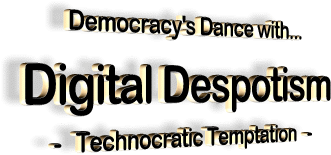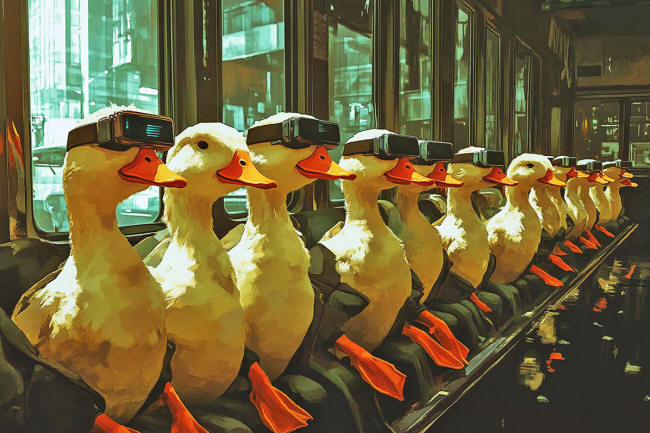|

by A Lily Bit
October 12, 2024
from
ALilyBit Website
|
A
Lily Bit
Former intelligence operative analyzing the "Great
Reset," the "Fourth Industrial Revolution," propaganda,
totalitarianism, current narratives, psychology, and
history.
What matters now isn't storytelling; what matters is
telling a true story well. |

How the
Technocratic Temptation
turns Silicon Solutions
into Societal Control...
Let's examine the raw, pulsating heart of today's governance crises.
Populist movements, those so-called 'disruptors'
of the status quo, aren't just random eruptions of public
discontent:
they are the inevitable backlash against a
political system that has blatantly failed to deliver.
These movements, feeding off fear and division,
highlight not just a crack but a chasm in public trust - a gap so
wide that it beckons the question:
Is this chaos orchestrated or merely the
clumsy stumble toward a new oligarchy dressed in technocratic
garb?
Consider this:
as democracy flounders, gasping for
relevance, are we not witnessing the stage being set for a
technocratic takeover?
Imagine a future where your 'vote' is as
impactful as a 'like' on a corporate executive's latest policy
tweet.
Here, industry titans and seasoned politicians merge into a hybrid
beast, promising efficiency but at the cost of what?
Your voice, your choice, your democracy...
Technocracy, cloaked in the allure
of expertise and efficiency, promises to solve problems with the
precision of a surgeon.
But let's not be naive.
This isn't about solving problems:
it's about control...!
When the U.S. flirted with the idea through its
Manufacturing Jobs Initiative, it wasn't just about gaining
insights:
it was a test run for a governance model
where decisions are made in boardrooms, not ballot boxes.
Here, the 'scientific method' becomes a pretext
for autocracy, where decisions are as sterile and devoid of human
touch as an algorithm.
The technocratic ethos assumes that those at the top, these
so-called experts, will act in the public's interest. But history
scoffs at this notion.
Look at the Chinese Communist Party, a
prime specimen of technocratic rule.
Efficient? Undoubtedly.
But at what cost? Freedom, dissent, and
individuality are squashed under the guise of unity and
progress.
Here's where the cynicism kicks in:
if efficiency is the measure of success, then
perhaps we should all aspire to be as 'successful' as drones in
a hive.
And then there's Singapore, often
paraded as the poster child of technocracy.
Yes, it's clean, it's rich, it's advanced.
But peel back the layers, and what do you
find?
A society where the richness of public debate
is supplanted by the sterility of imposed consensus.
Here, the government acts more like a
corporate entity, where public opinion is a mere formality, not
a foundation.
Here we are, in the shadow of the Great
Depression's echoes, where the idea of technocracy first found
fertile ground.
Fast forward to today, and we're not just
flirting with technocracy; we're on the brink of marrying it, driven
by the same disillusionment with political ineptitude.
But let's not be romantics about this union.
The historical allure of technocracy, this
notion of replacing bumbling politicians with the crisp
efficiency of scientists and engineers, always surges back like
a bad habit during times of crisis.
But think about it:
are we genuinely considering handing over the
reins of power to the Zuckerbergs and Musks of the
world because our current leaders can't pass legislation without
turning it into a circus...?
Let's dissect this with a critical eye.
The Kochs and Zuckerbergs of our
era, through their opaque LLCs and boundless funds, are not just
whispering in the ears of politicians:
they're practically writing the script...
This isn't just influence:
it's a soft coup by the
technocratic elite, bypassing the democratic process under
the guise of 'efficiency' and 'problem-solving'...
Now, consider the implications:
When we turn to the private sector, to these
titans of industry, for governance, what are we really asking
for?
Efficiency, yes, but at what cost?
Democracy thrives on debate, diversity, and
sometimes, delightful chaos.
Technocracy, on the other hand, operates on
algorithms and bottom lines.
When
Elon Musk proposes a solution,
it's brilliant, it's sleek, but politics isn't just about solutions:
it's about consensus, about navigating the
human messiness that no AI or algorithm can fully comprehend or
manage.
Here's where the economic theory bites back:
In a technocracy, decisions are economic, not
political.
They're about optimizing resources, not
optimizing human welfare.
When industry leaders step into governance,
their solutions might look great on a profit and loss statement
but could very well ignore the nuanced needs of a diverse
populace.
And let's inject some cynicism here:
these technocrats, with their tech empires
and billion-dollar initiatives, aren't just playing at
policy-making... they're potentially crafting a world where
their economic dominance translates into political power...!
Are we ready to live in a society where the
boardroom decisions of a few dictate the daily lives of the many?
Technocracy is a fundamentally different beast, one that could very
well chew up the principles of representation and spit out a
streamlined, but soulless, corporate governance model.
Are we prepared to make this trade, or should
we fight to fix the democratic flaws that make
technocracy seem like an appealing escape route?
The skepticism towards technocracy isn't just
about fearing change but about recognizing patterns that could lead
to an unprecedented consolidation of power.
The idea that technocracy could strip away private property
under the guise of "efficiency" or "economic management" isn't just
a theoretical fear; it's rooted in historical examples where central
control over economic resources led to significant curtailment of
individual freedoms.
The Trilateral Commission, with its
focus on policy integration across continents, does indeed present a
facade of enhancing democratic governance, yet its approach
to 'managing' democracy by suggesting a reduction in its excess can
be seen as a move towards more autocratic control.
Let's delve into the implications of this technocratic shift:
-
Economic Control:
If technocrats decide the distribution of
resources, what happens to entrepreneurship, innovation, or
even personal ambition?
The notion of universal basic income,
while on the surface provides security, could also be viewed
as a tool for control.
When your basic needs are met by the
system, how freely can you oppose it?
-
Surveillance
and Data:
The scenario where companies like
Google or Amazon become
integral to daily life isn't just about convenience; it's
about surveillance.
The data they collect could theoretically
be used to predict, influence, and
control behavior...
Here, technocracy doesn't just govern:
it monitors, predicts, and
potentially manipulates...
-
Political
Puppetry:
The notion that politicians might already
be "useful idiots" in a technocratic system where decisions
are made by unelected experts or corporate entities
challenges the very core of representative democracy.
If true, then elections become mere
formalities, not expressions of public will but
validations of pre-selected choices by technocratic elites.
This creeping technocracy, where technology
companies and unelected bodies potentially hold more sway over daily
life than elected officials, does paint a picture of a New World
Order.
It's a world where efficiency and
technological advancement might come at the cost of privacy,
freedom, and democratic participation...
The critical question then becomes:
Are we, as a society, willing to trade the
messiness of democracy for the streamlined, yet potentially
soulless, efficiency of technocracy?
Or can we find a balance where technology
serves humanity without governing it, where
innovation thrives alongside privacy and individual rights?
This debate isn't just for "conspiracy theorists"
but for anyone concerned with the future trajectory of global
governance...
|


